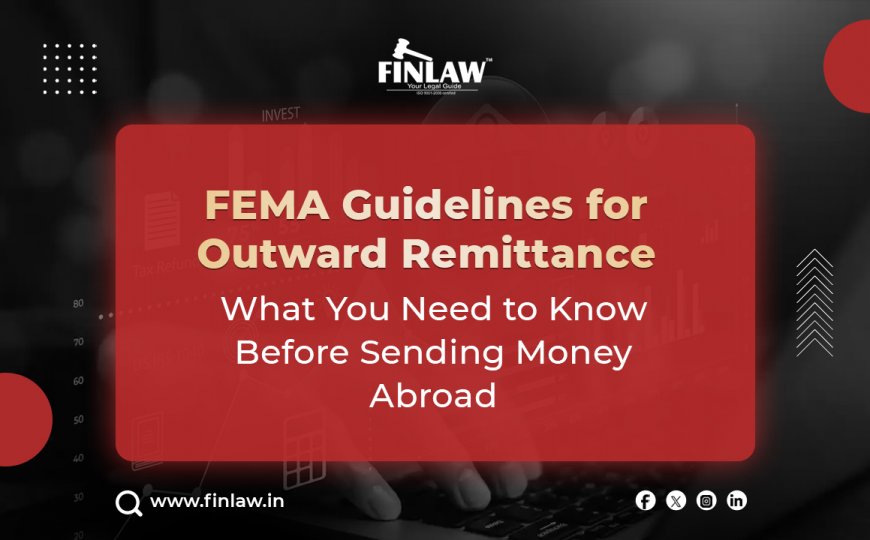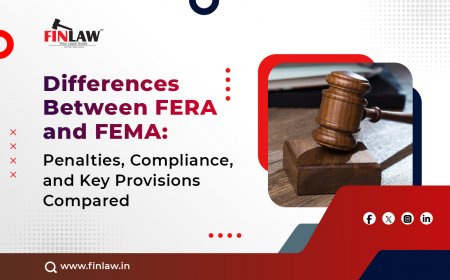FEMA Guidelines for Outward Remittance: What You Need to Know Before Sending Money Abroad
Learn about FEMA guidelines for outward remittance, RBI rules, LRS limits, documentation, TCS, and compliance to ensure hassle-free international transfers.

In today's interconnected world, individuals and businesses in India frequently engage in international financial transactions. Whether it's funding education abroad, investing in foreign assets, or paying for services rendered by overseas entities, understanding the regulatory framework governing outward remittances is crucial. The Foreign Exchange Management Act (FEMA) of 1999, along with guidelines from the Reserve Bank of India (RBI), provides a structured approach to managing foreign exchange transactions. This article delves into the essential aspects of FEMA guidelines for outward remittance, ensuring you are well-informed before initiating any international fund transfers.
Understanding Outward Remittance
Outward remittance refers to the process of transferring funds from a resident in one country to a beneficiary in another. In the Indian context, it involves the transfer of money in foreign exchange by a resident in India to a beneficiary situated outside the country (excluding Nepal and Bhutan) for purposes approved under FEMA. These purposes can range from personal needs, such as education and medical expenses, to business requirements like importing goods or services.
FEMA Guidelines for Outward Remittance in India
The FEMA guidelines for outward remittance are designed to regulate the movement of foreign exchange and prevent money laundering, tax evasion, and other financial malpractices. Under FEMA, outward remittances can be broadly categorized into current account transactions and capital account transactions.
Current Account Transactions
Current account transactions include payments related to trade, travel, education, medical expenses, and personal transfers. The RBI allows these remittances under the automatic route, meaning they do not require prior approval unless specifically restricted.
Some common outward remittances under current account transactions include:
-
Education Expenses: Tuition fees, accommodation, and related expenses for studying abroad.
-
Medical Treatment: Payments for hospitalization, surgeries, and treatments outside India.
-
Travel Expenses: Foreign exchange for business travel, tourism, and pilgrimage.
-
Family Maintenance: Sending money to relatives residing abroad.
-
Payment for Imports: Businesses paying for goods and services imported from foreign suppliers.
Capital Account Transactions
Capital account transactions involve financial investments and asset purchases outside India. These include:
-
Investment in Foreign Stocks and Bonds: Indian residents can invest in foreign securities under FEMA.
-
Real Estate Purchases Abroad: Buying property in foreign countries.
-
Setting up a Business Overseas: Indian entrepreneurs can establish joint ventures (JVs) or wholly-owned subsidiaries (WOS) abroad.
The Liberalized Remittance Scheme (LRS)
To facilitate ease of transferring funds abroad, the RBI introduced the Liberalized Remittance Scheme (LRS). Under this scheme, Indian residents, including minors, are permitted to remit up to USD 250,000 per financial year (April to March) for any permissible current or capital account transaction or a combination of both. This limit encompasses various purposes, including:
-
Education: Covering tuition fees, accommodation, and other related expenses.
-
Travel: Personal or business trips abroad.
-
Medical Treatment: Expenses for medical care overseas.
-
Investment: Purchasing shares, debt instruments, or setting up joint ventures and wholly-owned subsidiaries abroad.
-
Gifts and Donations: Sending money to relatives or charitable organizations abroad.
It's important to note that the LRS limit is cumulative. For instance, if an individual remits USD 100,000 for education, they can only remit an additional USD 150,000 for other purposes within the same financial year.
Prohibited Transactions Under LRS
While the LRS offers flexibility, certain transactions are expressly prohibited under FEMA guidelines for outward remittance. These include:
-
Remittance for Margins or Margin Calls: To overseas exchanges or counterparties.
-
Lottery and Gambling: Including sweepstakes and betting.
-
Proscribed Magazines: Remittance for the purchase of banned or proscribed magazines.
-
Trading in Foreign Exchange Abroad: Remittances for forex trading abroad are not permitted.
Engaging in these prohibited transactions can lead to penalties under FEMA regulations.
Documentation and Compliance Requirements
Before initiating an outward remittance, individuals must ensure compliance with the prescribed documentation:
-
Permanent Account Number (PAN): Mandatory for all remittances under LRS.
-
Form A2: A declaration form stating the purpose of the remittance.
-
Additional Documents: Depending on the purpose, such as an admission letter from a foreign institution for education-related remittances or a proforma invoice for the import of services.
Authorized Dealer (AD) banks are responsible for verifying the authenticity of documents and ensuring that remittances align with FEMA regulations, check out FEMA Compliance Checklist. They must also ensure that the cumulative remittances by an individual do not exceed the prescribed LRS limit in a financial year.
Tax Collected at Source (TCS) on Foreign Remittances
As per the Finance Act 2020, a Tax Collected at Source (TCS) is applicable on outward remittances:
-
5% TCS: On amounts exceeding INR 7 lakh in a financial year.
-
0.5% TCS: If the remittance is for education and is funded by a loan from a financial institution.
For example, if you remit INR 10 lakh for education (without a loan), TCS would be applicable on INR 3 lakh (the amount exceeding INR 7 lakh), resulting in a TCS of INR 15,000.
It's essential to understand that TCS is not an additional tax but can be adjusted against your total income tax liability. Ensure to collect the TCS certificate from your AD bank for tax filing purposes.
Special Considerations for Businesses
Businesses in India engaging in outward remittances for imports, investments, or other purposes must adhere to specific FEMA guidelines for outward remittance:
-
Current Account Transactions: Generally permitted without restrictions, provided they are not prohibited and adhere to the exchange rate norms.
-
Capital Account Transactions: Such as investments abroad, require compliance with specific regulations and, in some cases, prior approval from the RBI.
Businesses must maintain meticulous records of all foreign exchange transactions and ensure timely reporting to the RBI, especially for capital account transactions.
Penalties for Non-Compliance
Non-compliance with FEMA regulations can lead to severe penalties:
-
Monetary Penalties: Up to three times the amount involved in the contravention.
-
Property Confiscation: In cases of severe violations, properties involved in the contravention can be confiscated.
-
Legal Proceedings: Initiation of legal action, which can lead to further fines and imprisonment.
To avoid such repercussions, it's imperative to ensure all remittances comply with FEMA guidelines and that accurate documentation is maintained.
Conclusion
Navigating the complexities of outward remittances from India requires a thorough understanding of FEMA guidelines for outward remittance and RBI regulations. Whether you're an individual planning to fund education abroad or a business aiming to invest overseas, adhering to the prescribed norms ensures a seamless and compliant transfer of funds. Always consult with your Authorized Dealer bank or a financial advisor to stay updated on any changes in regulations and to ensure that your remittances align with the current legal framework.
By staying informed and diligent, you can effectively manage your international financial transactions, contributing to a robust and compliant financial ecosystem.
What's Your Reaction?



















